人教版(2019)选择性必修第二册Unit 2Bridging Cultures Grammar focus Noun Clauses 课件(25张ppt)
文档属性
| 名称 | 人教版(2019)选择性必修第二册Unit 2Bridging Cultures Grammar focus Noun Clauses 课件(25张ppt) | 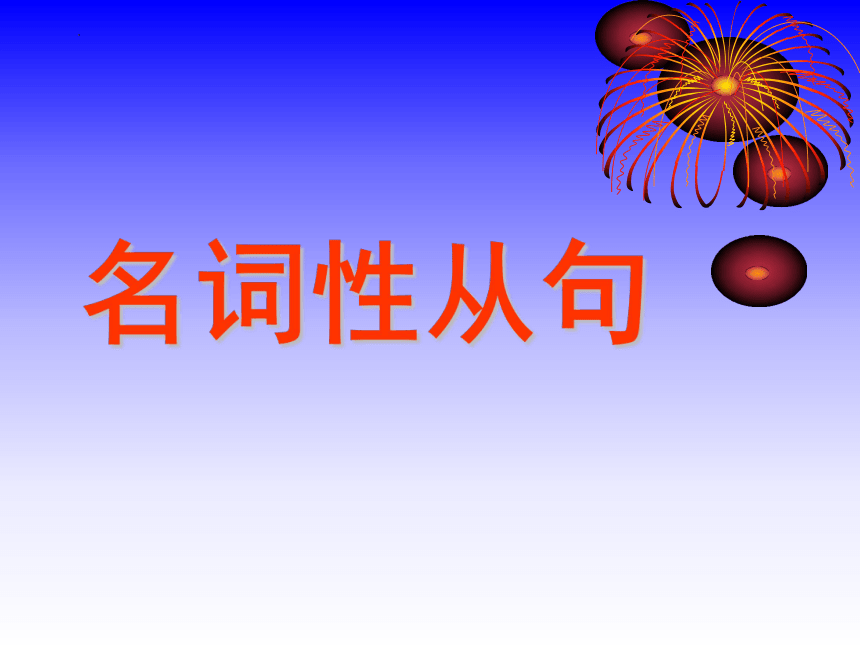 | |
| 格式 | pptx | ||
| 文件大小 | 677.4KB | ||
| 资源类型 | 教案 | ||
| 版本资源 | 人教版(2019) | ||
| 科目 | 英语 | ||
| 更新时间 | 2023-02-09 10:44:15 | ||
图片预览

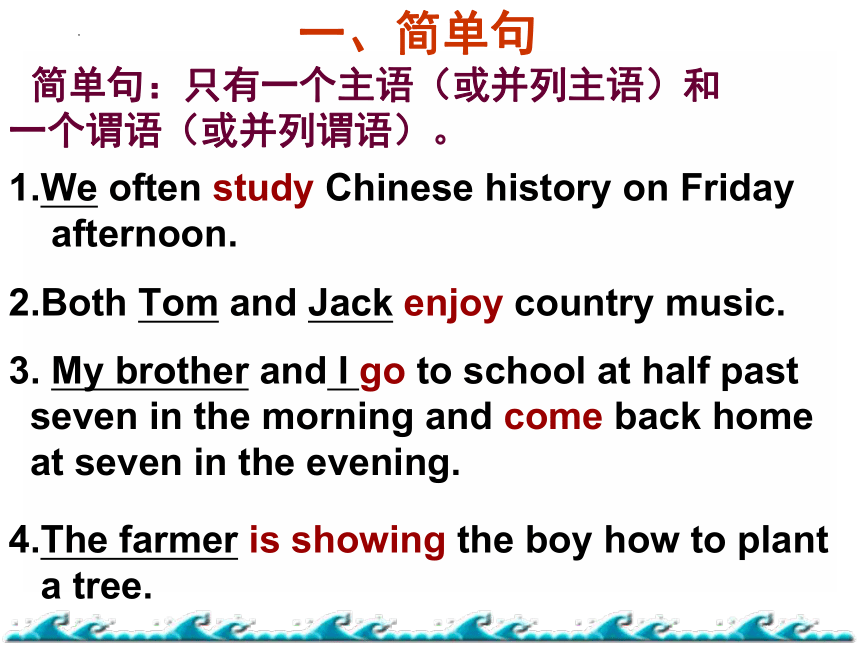
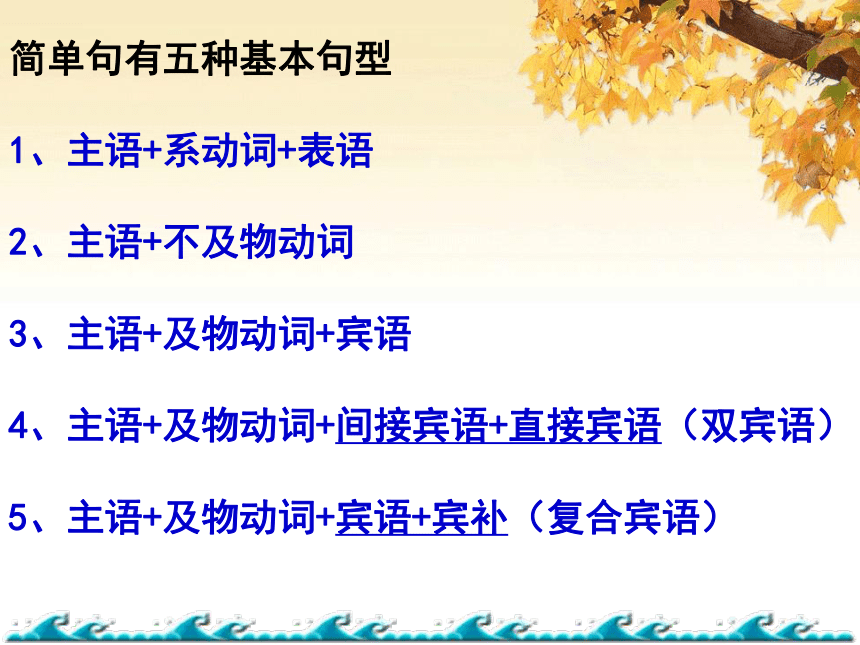
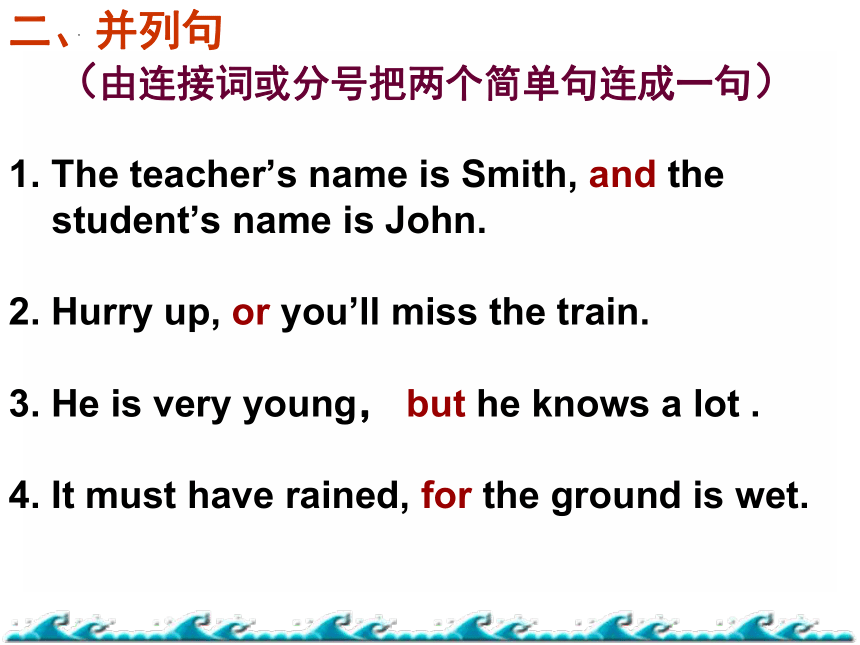
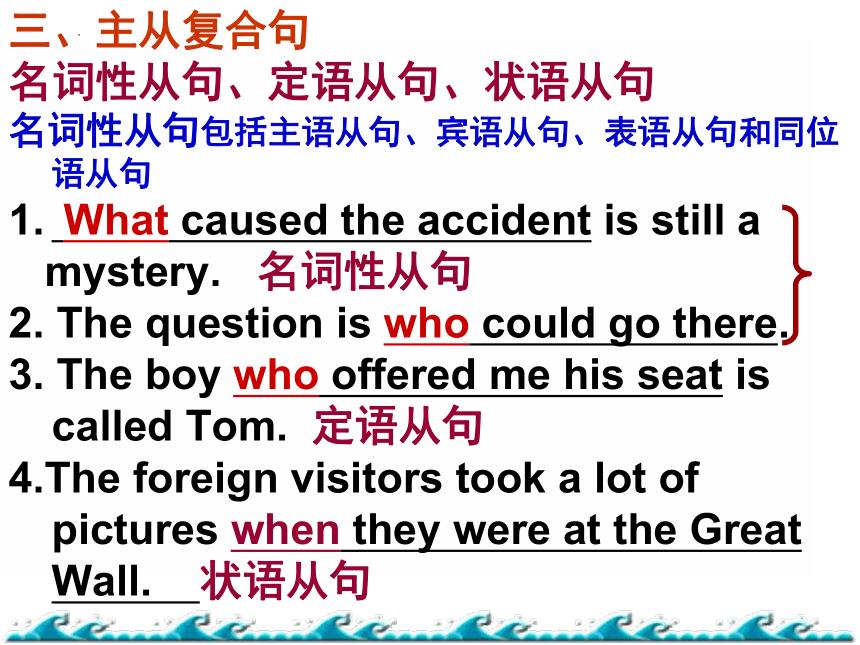
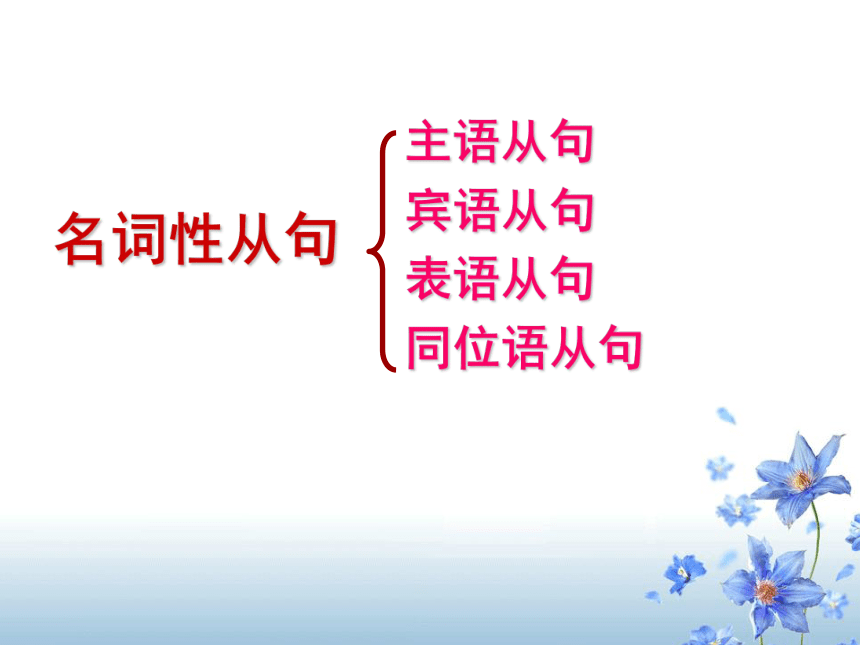
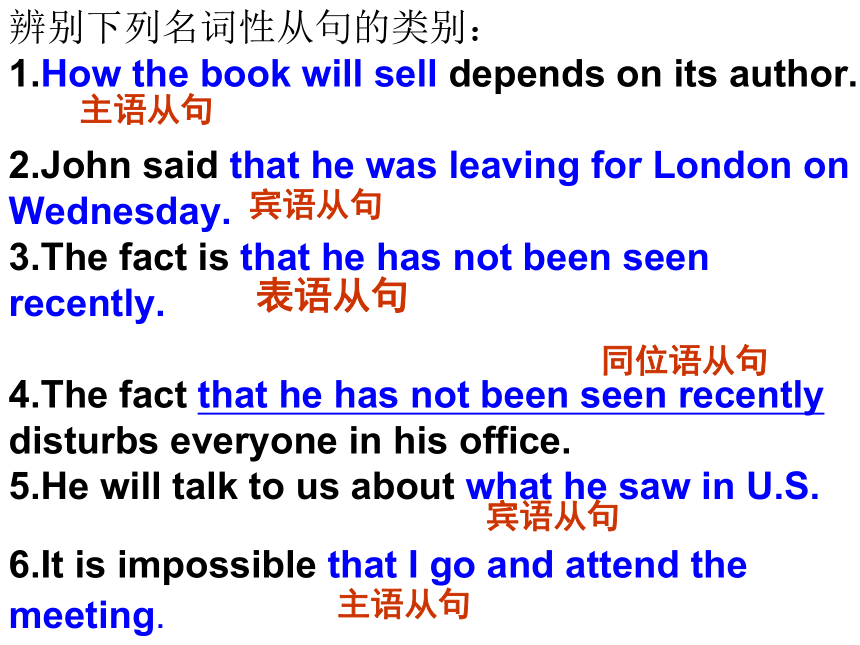
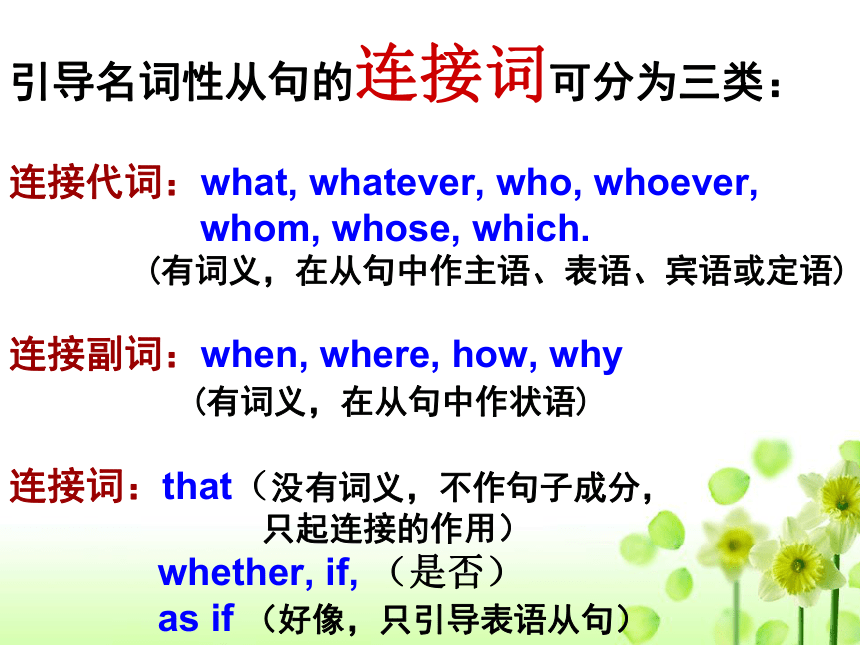
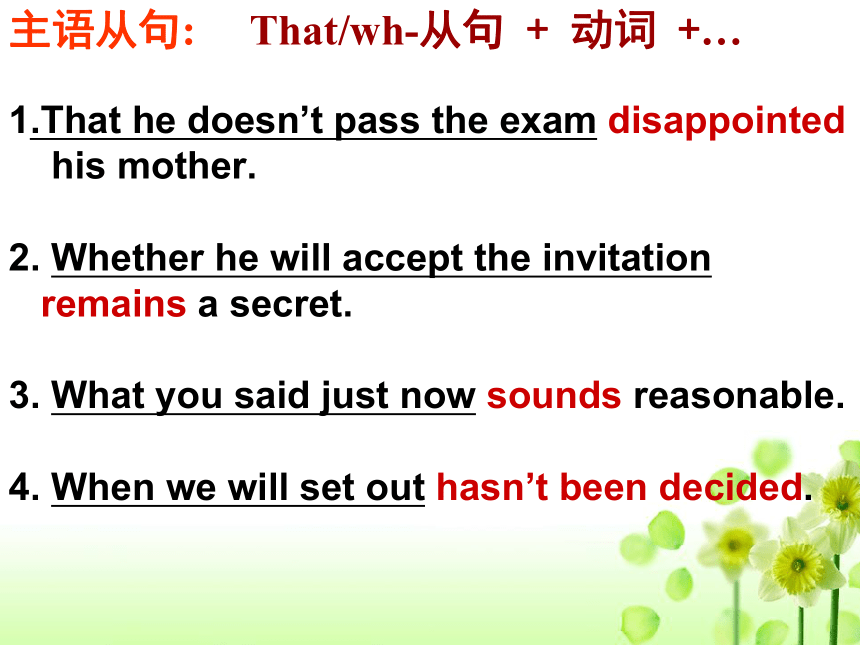
文档简介
(共25张PPT)
名词性从句
一、简单句
简单句:只有一个主语(或并列主语)和
一个谓语(或并列谓语)。
1.We often study Chinese history on Friday
afternoon.
2.Both Tom and Jack enjoy country music.
3. My brother and I go to school at half past
seven in the morning and come back home
at seven in the evening.
4.The farmer is showing the boy how to plant
a tree.
简单句有五种基本句型
1、主语+系动词+表语
2、主语+不及物动词
3、主语+及物动词+宾语
4、主语+及物动词+间接宾语+直接宾语(双宾语)
5、主语+及物动词+宾语+宾补(复合宾语)
1. The teacher’s name is Smith, and the student’s name is John.
2. Hurry up, or you’ll miss the train.
3. He is very young, but he knows a lot .
4. It must have rained, for the ground is wet.
二、并列句
(由连接词或分号把两个简单句连成一句)
三、主从复合句
名词性从句、定语从句、状语从句
名词性从句包括主语从句、宾语从句、表语从句和同位语从句
What caused the accident is still a
mystery. 名词性从句
2. The question is who could go there.
3. The boy who offered me his seat is called Tom. 定语从句
4.The foreign visitors took a lot of pictures when they were at the Great Wall. 状语从句
主语从句
宾语从句
表语从句
同位语从句
名词性从句
辨别下列名词性从句的类别:
1.How the book will sell depends on its author.
2.John said that he was leaving for London on
Wednesday.
3.The fact is that he has not been seen recently.
4.The fact that he has not been seen recently disturbs everyone in his office.
5.He will talk to us about what he saw in U.S.
6.It is impossible that I go and attend the meeting.
主语从句
宾语从句
表语从句
同位语从句
宾语从句
主语从句
引导名词性从句的连接词可分为三类:
连接代词:what, whatever, who, whoever,
whom, whose, which.
(有词义,在从句中作主语、表语、宾语或定语)
连接副词:when, where, how, why
(有词义,在从句中作状语)
连接词:that(没有词义,不作句子成分,
只起连接的作用)
whether, if, (是否)
as if (好像,只引导表语从句)
主语从句: That/wh-从句 + 动词 +…
1.That he doesn’t pass the exam disappointed
his mother.
2. Whether he will accept the invitation
remains a secret.
3. What you said just now sounds reasonable.
4. When we will set out hasn’t been decided.
带形式主语it的主语从句
it 作带形式主语,而将真正的that-从句置于句末,例如:
It's a pity that you should have to leave.
It is not yet decided who will do that job.
用 it 作形式主语的that- 从句有以下搭配关系:
a. It + be +形容词+ that-从句
It is necessary / important
obvious / certain…
b.It + be +名词+ that-从句
It is a pity/a shame/no wonder … that…
c. It + be + -ed 分词+ that-从句
It is believed/ reported / said that…
It is known to all that…
d. It +不及物动词+ that-分句
It appears/seems that…
It happens that…
It occurred to me that
that…
1. My decision is that all of us are to start
at 6’oclock tomorrow
2. This is why we put off the sport meet.
3.She looked as if she’d been crying.
4. That they won the game was what we
had expected.
表语从句: 主+系动词 + that/wh-从句
宾语从句
1.主 + 及物动词 + that/wh-从句
I doubt whether he will succeed.
2.主 + 不及物动词 + 介词 + that/ wh-从句
He is a good student except that he is careless.
3.主 + 系动词 + 形容词 + that/wh-从句
I am not sure what I ought to do.
We consider it necessary that he should improve his pronunciation.
带形式宾语it的宾语从句
1.We must face the fact that we had spent all our money.
2. I have no doubt that he will come soon.
同位语从句
抽象名词 + that/wh-从句
fact, news, doubt, decision, theory等
只能用whether 不能用 if 的情况:
Whether he will come is unknown.
2. 表语从句,如:
The question is whether you should accept it.
3. 同位语从句,如:
The question whether he’ll attend the meeting is not decided.
4.宾语从句位于介词后,如:
I’m not interested in whether they’ll go or not. It depends on whether we have got enough money.
5. 直接跟不定式或or not连用时,如:
She hasn’t decided whether to go or not.
主语从句
用if 或 whether 填空
1. I don’t know __________ I’ll be free tomorrow.
2. I don’t know _________ or not I’ll be free tomorrow.
3. The question is _________ this book is worth writing.
4. It depends on _________ we will have enough money.
5. ________ they can do it matters little to us.
6._______ you are not free tomorrow , I’ll go without you.
whether / if
whether
whether
whether
Whether
If
考点一:考查名词性从句中that与what的区别
1. _____ we can't get seems better than
______ we have.
2._______ he suddenly fell ill last week made us surprised
What
what
That
考点二:考查名词性从句中的it作形式主语或
形式宾语
1.____ is a fact that English is being accepted as an international language.
2. We all thought ____ a pity that we had missed the lesson.
it
It
考点三:考查名词性从句中的whether, if以及that的区别
1. _______ we'll go camping tomorrow depends on the weather.
2. The miners trapped in the coal mine worried about________ they would survive.
3. It worried her a bit _______ her hair was turning gray.
Whether
whether
that
考点四:考查名词性从句中的疑问词+ever引导的名词性从句及其与疑问词引导的从句的区别
_________ leaves the room last ought to turn off the light.
________leaved the room last did not turn off the light last night.
3.It is generally considered unwise to give a child ___________ he or she wants.
whatever
Whoever
Who
引导名词性从句不能用no matter + 疑问词
1.在主语从句中用来表示惊奇、不相信、惋惜、理应如此等,谓语动词用虚拟语气 (should) +do,常用的句型有:
(1) It is necessary (important, natural, strange, etc.) that...
(2) It is a pity (a shame, no wonder, etc.) that...
(3) It is suggested (requested, proposed, desired, etc.) that...
It is strange that she ___________ (think) so.
考点五:考查名词性从句的虚拟语气问题
It is necessary that a college student ___________ (master) at least a foreign language.
should master
(should) think
2 表示建议、请求、命令、要求、坚持等及物动词后面的宾语从句中要用虚拟语气,常用的这类动词有suggest, propose, insist, desire, demand, request, order, command等。如:
I insist that she ___________(do) her work alone.
3 主语是suggestion, proposal, request, decision等表示"建议、请求、要求、决定等"意思的词时,表语从句中谓语动词要用虚拟语气"(should) +do"。如:
His suggestion is that we ___________ (hold) another meeting to discuss the question.
(should) do
(should) hold
宾语从句的时态变化规律
1)当主语是一般现在时态时,从句可根据需要用的任何时态
2)当主句是一般过去时态时,从句只能使用过去范围内的任何时态.但客观真理除外.
The teacher said that he had won the first prize in the competition.
The teacher said that the earth goes round the sun.
He said the text was very important and we should learn it by heart.
2. My worry is that he can get there on time.
3. The reason why he failed was because he hadn’t studied hard.
4. What we need are time.
5. Here are two books. You can take whatever you want.
is
that
whether
that
whichever
1.It now appears ______ they are in need of help.
2.It is good news ______ they will arrive in a few days.
3.It is thought ______ Joe drives badly.
4.It may be______ he is late for class.
5.This is ______ she was born.
6.The question is ______ we can’t go there today.
7.The question is __________ it is worth doing.
8.The reason he has made such great progress is _______ he has never wasted his time.
9.My suggestion is ______ we should turn the land into rice fields.
10.My advice is that he ______ regular house.
that
that
that
that
where
that
whether
that
that
should
名词性从句
一、简单句
简单句:只有一个主语(或并列主语)和
一个谓语(或并列谓语)。
1.We often study Chinese history on Friday
afternoon.
2.Both Tom and Jack enjoy country music.
3. My brother and I go to school at half past
seven in the morning and come back home
at seven in the evening.
4.The farmer is showing the boy how to plant
a tree.
简单句有五种基本句型
1、主语+系动词+表语
2、主语+不及物动词
3、主语+及物动词+宾语
4、主语+及物动词+间接宾语+直接宾语(双宾语)
5、主语+及物动词+宾语+宾补(复合宾语)
1. The teacher’s name is Smith, and the student’s name is John.
2. Hurry up, or you’ll miss the train.
3. He is very young, but he knows a lot .
4. It must have rained, for the ground is wet.
二、并列句
(由连接词或分号把两个简单句连成一句)
三、主从复合句
名词性从句、定语从句、状语从句
名词性从句包括主语从句、宾语从句、表语从句和同位语从句
What caused the accident is still a
mystery. 名词性从句
2. The question is who could go there.
3. The boy who offered me his seat is called Tom. 定语从句
4.The foreign visitors took a lot of pictures when they were at the Great Wall. 状语从句
主语从句
宾语从句
表语从句
同位语从句
名词性从句
辨别下列名词性从句的类别:
1.How the book will sell depends on its author.
2.John said that he was leaving for London on
Wednesday.
3.The fact is that he has not been seen recently.
4.The fact that he has not been seen recently disturbs everyone in his office.
5.He will talk to us about what he saw in U.S.
6.It is impossible that I go and attend the meeting.
主语从句
宾语从句
表语从句
同位语从句
宾语从句
主语从句
引导名词性从句的连接词可分为三类:
连接代词:what, whatever, who, whoever,
whom, whose, which.
(有词义,在从句中作主语、表语、宾语或定语)
连接副词:when, where, how, why
(有词义,在从句中作状语)
连接词:that(没有词义,不作句子成分,
只起连接的作用)
whether, if, (是否)
as if (好像,只引导表语从句)
主语从句: That/wh-从句 + 动词 +…
1.That he doesn’t pass the exam disappointed
his mother.
2. Whether he will accept the invitation
remains a secret.
3. What you said just now sounds reasonable.
4. When we will set out hasn’t been decided.
带形式主语it的主语从句
it 作带形式主语,而将真正的that-从句置于句末,例如:
It's a pity that you should have to leave.
It is not yet decided who will do that job.
用 it 作形式主语的that- 从句有以下搭配关系:
a. It + be +形容词+ that-从句
It is necessary / important
obvious / certain…
b.It + be +名词+ that-从句
It is a pity/a shame/no wonder … that…
c. It + be + -ed 分词+ that-从句
It is believed/ reported / said that…
It is known to all that…
d. It +不及物动词+ that-分句
It appears/seems that…
It happens that…
It occurred to me that
that…
1. My decision is that all of us are to start
at 6’oclock tomorrow
2. This is why we put off the sport meet.
3.She looked as if she’d been crying.
4. That they won the game was what we
had expected.
表语从句: 主+系动词 + that/wh-从句
宾语从句
1.主 + 及物动词 + that/wh-从句
I doubt whether he will succeed.
2.主 + 不及物动词 + 介词 + that/ wh-从句
He is a good student except that he is careless.
3.主 + 系动词 + 形容词 + that/wh-从句
I am not sure what I ought to do.
We consider it necessary that he should improve his pronunciation.
带形式宾语it的宾语从句
1.We must face the fact that we had spent all our money.
2. I have no doubt that he will come soon.
同位语从句
抽象名词 + that/wh-从句
fact, news, doubt, decision, theory等
只能用whether 不能用 if 的情况:
Whether he will come is unknown.
2. 表语从句,如:
The question is whether you should accept it.
3. 同位语从句,如:
The question whether he’ll attend the meeting is not decided.
4.宾语从句位于介词后,如:
I’m not interested in whether they’ll go or not. It depends on whether we have got enough money.
5. 直接跟不定式或or not连用时,如:
She hasn’t decided whether to go or not.
主语从句
用if 或 whether 填空
1. I don’t know __________ I’ll be free tomorrow.
2. I don’t know _________ or not I’ll be free tomorrow.
3. The question is _________ this book is worth writing.
4. It depends on _________ we will have enough money.
5. ________ they can do it matters little to us.
6._______ you are not free tomorrow , I’ll go without you.
whether / if
whether
whether
whether
Whether
If
考点一:考查名词性从句中that与what的区别
1. _____ we can't get seems better than
______ we have.
2._______ he suddenly fell ill last week made us surprised
What
what
That
考点二:考查名词性从句中的it作形式主语或
形式宾语
1.____ is a fact that English is being accepted as an international language.
2. We all thought ____ a pity that we had missed the lesson.
it
It
考点三:考查名词性从句中的whether, if以及that的区别
1. _______ we'll go camping tomorrow depends on the weather.
2. The miners trapped in the coal mine worried about________ they would survive.
3. It worried her a bit _______ her hair was turning gray.
Whether
whether
that
考点四:考查名词性从句中的疑问词+ever引导的名词性从句及其与疑问词引导的从句的区别
_________ leaves the room last ought to turn off the light.
________leaved the room last did not turn off the light last night.
3.It is generally considered unwise to give a child ___________ he or she wants.
whatever
Whoever
Who
引导名词性从句不能用no matter + 疑问词
1.在主语从句中用来表示惊奇、不相信、惋惜、理应如此等,谓语动词用虚拟语气 (should) +do,常用的句型有:
(1) It is necessary (important, natural, strange, etc.) that...
(2) It is a pity (a shame, no wonder, etc.) that...
(3) It is suggested (requested, proposed, desired, etc.) that...
It is strange that she ___________ (think) so.
考点五:考查名词性从句的虚拟语气问题
It is necessary that a college student ___________ (master) at least a foreign language.
should master
(should) think
2 表示建议、请求、命令、要求、坚持等及物动词后面的宾语从句中要用虚拟语气,常用的这类动词有suggest, propose, insist, desire, demand, request, order, command等。如:
I insist that she ___________(do) her work alone.
3 主语是suggestion, proposal, request, decision等表示"建议、请求、要求、决定等"意思的词时,表语从句中谓语动词要用虚拟语气"(should) +do"。如:
His suggestion is that we ___________ (hold) another meeting to discuss the question.
(should) do
(should) hold
宾语从句的时态变化规律
1)当主语是一般现在时态时,从句可根据需要用的任何时态
2)当主句是一般过去时态时,从句只能使用过去范围内的任何时态.但客观真理除外.
The teacher said that he had won the first prize in the competition.
The teacher said that the earth goes round the sun.
He said the text was very important and we should learn it by heart.
2. My worry is that he can get there on time.
3. The reason why he failed was because he hadn’t studied hard.
4. What we need are time.
5. Here are two books. You can take whatever you want.
is
that
whether
that
whichever
1.It now appears ______ they are in need of help.
2.It is good news ______ they will arrive in a few days.
3.It is thought ______ Joe drives badly.
4.It may be______ he is late for class.
5.This is ______ she was born.
6.The question is ______ we can’t go there today.
7.The question is __________ it is worth doing.
8.The reason he has made such great progress is _______ he has never wasted his time.
9.My suggestion is ______ we should turn the land into rice fields.
10.My advice is that he ______ regular house.
that
that
that
that
where
that
whether
that
that
should
